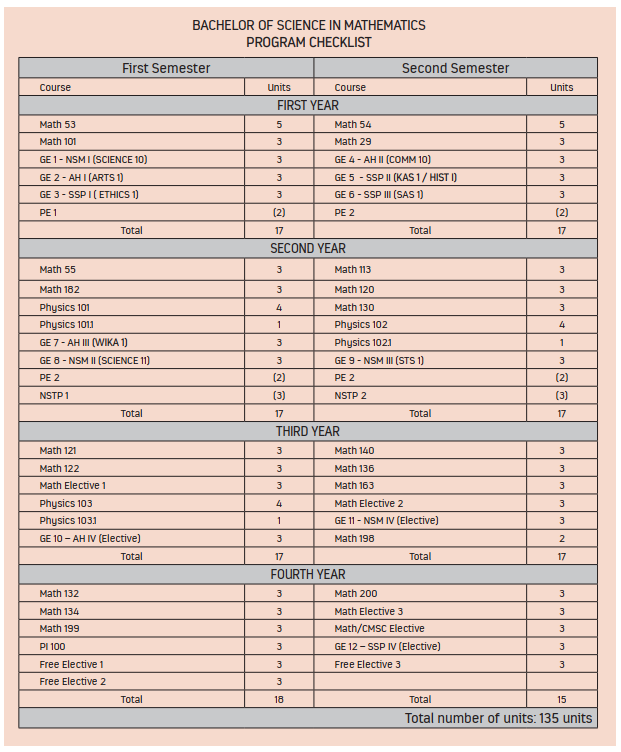

| PLOs | Generic Program Learning Outcomes |
|---|---|
| PLO 1 | Promote engagement in lifelong learning towards excellence in the field of expertise. |
| PLO 2 | Apply professional, social, and ethical responsibilities as active and participative citizens. |
| PLO 3 | Develop social and professional skills to build healthy, productive, and ethical working relationships with peers. |
| Specific Program Learning Outcomes | |
| PLO 4 | Develop mastery in the core and applied areas of mathematics. |
| PLO 5 | Develop skills in pattern recognition, abstraction, critical analysis, and problem- solving, and in making generalizations, synthesis, and rigorous arguments. |
| PLO 6 | Develop an enhanced perception of the strength and importance of mathematics in the modern world including inter-relationships within mathematics and its connections to the natural sciences, humanities and the arts, and the social sciences. |
| PLO 7 | Analyze current advances in mathematics research and propose conjectures that extend the theory. |
| Course | Course Title | Prereq. | Units |
|---|---|---|---|
| Math 29 | Basic Concepts in Mathematics | None | 3.0 |
| Math 53 | Elementary Analysis I | None | 5.0 |
| Math 54 | Elementary Analysis II | Math 53 | 5.0 |
| Math 55 | Elementary Analysis III | Math 54 | 3.0 |
| Course | Course Title | Prereq. | Units |
|---|---|---|---|
| Math 101 | Elementary Statistics | None | 3.0 |
| Math 113 | Differential Equations | Math 55 | 3.0 |
| Math 120 | Algebraic Structures I | Math 29 | 3.0 |
| Math 121 | Algebraic Structures II | Math 120 | 3.0 |
| Math 122 | Linear Algebra and Matrix Theory | Math 29 | 3.0 |
| Math 130 | Mathematical Analysis | Math 55 | 3.0 |
| Math 132 | Real Analysis | Math 55 | 3.0 |
| Math 134 | Complex Analysis | Math 55 | 3.0 |
| Math 136 | Introduction to Numerical Analysis | Math 113, 122 | 3.0 |
| Math 140 | Topological Structures | JS | 3.0 |
| Math 163 | Mathematical Statistics | Math 55 | 3.0 |
| Math 182 | Introduction to Computer Programming | Math 54 | 3.0 |
| Math 198 | Seminar | COI | 3.0 |
| Math 199 | Research in Mathematics | COI | 3.0 |
| Math 200 | Undergraduate Thesis | Math 199 | 3.0 |
| Course | Course Title | Prereq. | Units |
|---|---|---|---|
| Math 123 | Elementary Theory of Numbers | Math 29 or CMSC 55 | 3.0 |
| Math 133 | Introduction to Functional Analysis | Math 130 | 3.0 |
| Math 150 | Modern Geometry | Math 55 | 3.0 |
| Math 160 | Probability Theory | COI | 3.0 |
| Math 170 | Foundations of Mathematics | Math 29 or CMSC 55 | 3.0 |
| Math 181 | Mathematical Methods of Operation Research | Math 122 or CMSC 116 | 3.0 |
| Math 190 | Issues in Mathematics Education | Math 54 | 3.0 |
| CMSC 161 | Interactive Computer Graphics | CMSC 116 or Equivalent | 3.0 |
| CMSC 162 | Artificial Intelligence | CMSC 123 | 3.0 |
| CMSC 198 | Practicum | COI | 3.0 |
| Course | Course Title | Prereq. | Units |
|---|---|---|---|
| Physics 101 | Fundamental Physics I (lec) | Coreq: Math 53 | 4.0 |
| Physics 101.1 | Fundamental Physics I (lab) | Coreq: Physics 101 | 1.0 |
| Physics 102 | Fundamental Physics II (lec) | Physics 101, Physics 101.1, and Math 53 | 4.0 |
| Physics 102.1 | Fundamental Physics II (lab) | Coreq: Physics 102 | 1.0 |
| Physics 103 | Fundamental Physics III (lec) | Physics 102, Physics 102.1, and Math 54 | 4.0 |
| Physics 103.1 | Fundamental Physics III (lab) | Coreq: Physics 103.1 | 1.0 |
| A. Natural Sciences and Math (NSM) - 12 UNITS | |
|---|---|
| CORE | Science 10, Science 11, STS 1 |
| Elective | Math 10, Chem 1, Geol 1 |
| B. Arts and Humanities (AH) - 12 UNITS | |
| Core | Arts 1, Comm 10, Wika 1 |
| Elective | Philarts 1, MS 11 |
| C. Social Sciences and Philosophy (SSP) - 12 UNITS | |
| Core | Ethics 1, History 1, Kasaysayan 1, SAS 1 |
| Elective | Hist 3, Philo 27, Soc Sci 30 |
| Course | Course Title |
|---|---|
| PI 100 | Life of Rizal |
| 3 Free Electives | Any electives from the 3 colleges |
| NSTP | NSTP 1, NSTP 2 |
| PE | PE 1 (Required), any three from PE 2, PE 3 and PE 4 |

| A. Natural Sciences and Math (NSM) - 12 UNITS | |
|---|---|
| CORE | Science 10, Science 11, STS 1 |
| Elective | Math 10, Chem 1, Geol 1 |
| B. Arts and Humanities (AH) - 12 UNITS | |
| Core | Arts 1, Comm 12, Wika 1 |
| Elective | Philarts 1, MS 11 |
| C. Social Sciences and Philosophy (SSP) - 12 UNITS | |
| Core | Ethics 1, History 1, Kasaysayan 1, SAS 1 |
| Elective | Hist 3, Philo 27, Soc Sci 30 |
| No. of Math Courses Enrolled in | Minimum No. of Courses to Pass |
|---|---|
| 1 | 1 |
| 2 | 2 |
| 3 | 2 |
| 4 | 3 |
| 5 | 3 |
| 6 or more | 4 |